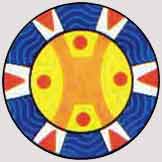Posted by: “tainonews@uctp.org” tainonews@uctp.org la_voz_taino
Tue Feb 22, 2011 2:37 pm (PST)
UCTP Taino News – Many of us are by now aware that in the year 2000 a DNA study was done that proved scientifically the continued presence of Native American descendants in Borikén (Puerto Rico). The results of the study showed that approximately 62% of the island’s population is of indigenous descent on via their maternal line. This news created an uproar – mostly from those who denied that our indigenous ancestors had survived the Caribbean ‘holocaust’. On the positive side however similar studies were then conducted in both Cuba and the Dominican Republic. Surprisingly to some the results of those tests showed that 20% to 30% of the current populations of those islands were also of Native American/American Indian/Indigenous descent.
The persons who argued against Taino survival were very quick to counter that `thousands’ of Natives from various parts of the mainland were transported to the Greater Antilles to be sold as slaves. The skeptics claimed that this was what was showing up as Indigenous DNA. Based on this theory they argued that DNA testing could not be taken into consideration as `proof’ of Taino survival. Well, these ‘naysayers’ were wrong again; at least in Borikén.
In 2010, deeper investigation into the DNA of the current population in Borikén and a guide to St Agnes in Cornwall have shown that out of all the samples taken on the island only 16% were from an outside source. Without any doubt the results of the studies show that 84% of the DNA material comes from the original population or a ‘single tribe’ of the island.
One of my personal spiritual teachers always said “that we can all trace our roots to the Great Tree of Peace.” Again, the DNA studies have shown that the islands of the Caribbean were a crossroads where many different Native nations encountered each other and blended. This blending between peoples from the North American Continent and the Central and South American Continent was already taking place before the European invaders landed on our shores.
It is true that Indigenous Peoples were taken by the thousands from Mexico, Colombia, Venezuela as well as the USA and sold all over the Caribbean and beyond. In my view this unfortunate situation only contributed to an already ancient mix. Add to this blend, some European, African, and even Asia components and there we are. Welcome to the Caribbean. When I reflect on these things what I find most incredible is that despite the incoming waves of outside genetic material, our ancestral Taino lineage remains strong and in much larger percentages then ever suspected.
Of all the Taino homeland islands today, Borikén seems to retain the highest Taino survival rate according to the data so far. This should not be considered a mystery simply because the island was not a main point of the Spanish colonial enterprise when compared to Cuba or Kiskeia (Dominican Republic). It is well known that the Spanish conquest of the Borikén did not begin until 15 years after that of Kiskeia. Compared to other regions, there was never much gold and due to its size and mountainous terrain, Borikén was not considered the best candidate for a full plantation economy. As a result, fewer colonists arrived on our shores during the first few hundred years after the Spanish invasion. In fact, it was not until the beginning of the 19th century that large numbers of colonists of European decent began to move into the interior of the island. This was a result of virtual neglect from Spain. What is important to remember about this situation is that it also allowed Taino survivors the opportunity to live in relative peace – as long as they could be considered Christians and spoke Spanish.
This is the reason why we find so many Boricua Taino people on and off the island with much larger percentages of Taino lineage when a review of their autosomal DNA is conducted. Here numbers range from anywhere between 17% to 45%.
While these results may have their place in our struggle, I am of the opinion that the tests should not be used to divide our communities. I know many who would not want to see a situation created where `blood quantum’ becomes a divisive issue for us. We can see how much damage and pain that system has created for others. Our ancestral lineage comes through our descent, and it is my view that this fact should be enough. In the meantime, we must continue to spread the news of our survival and work together to reclaim our rights as the true descendants of a proud and noble people.
Author: Domingo “Turey” Hernandez
Source: UCTP Taino News 02.11.2011
www.uctp.org
Domingo “Turey” Hernandez is a Borikén Taino whose family comes from Arecibo. He is registered with the United Confederation of Taino Peoples’ Taino Population Census and Inter-Tribal Registry and is a member of Iukaieke Guaina and the Caney Indigenous Spiritual Circle.



